Stories > Journey to an Inclusive World
Journey to an Inclusive World
Social entrepreneur Isabel Phua established a cause-driven travel and education platform to educate youths on migrant workers and their role in Singapore.
BY AUDRINA GAN
ike many social entrepreneurs, Isabel Phua’s journey began with a volunteering stint.
Then only 20, she chose to dedicate her free time to Healthserve, a non-profit organisation (NGO) that provides highly subsidised medical care to low-wage migrant workers in Singapore. Over the course of time, she became friends with some of them.
“My friends and I would visit them in their dormitories weekly to have meals together, and if they were being mistreated at work or had an injury, we would connect them with the local NGOs who could offer assistance,” she recalls.
The brief experience led to a fundraising partnership with HOME, an NGO that advocates for migrant workers’ rights. Her friendship with the migrant workers deepened and she started hosting dinners for them with her family at her house during public holidays. “My father, being an engineer, would also remind them about the safety aspects of their work at construction sites,” she adds.
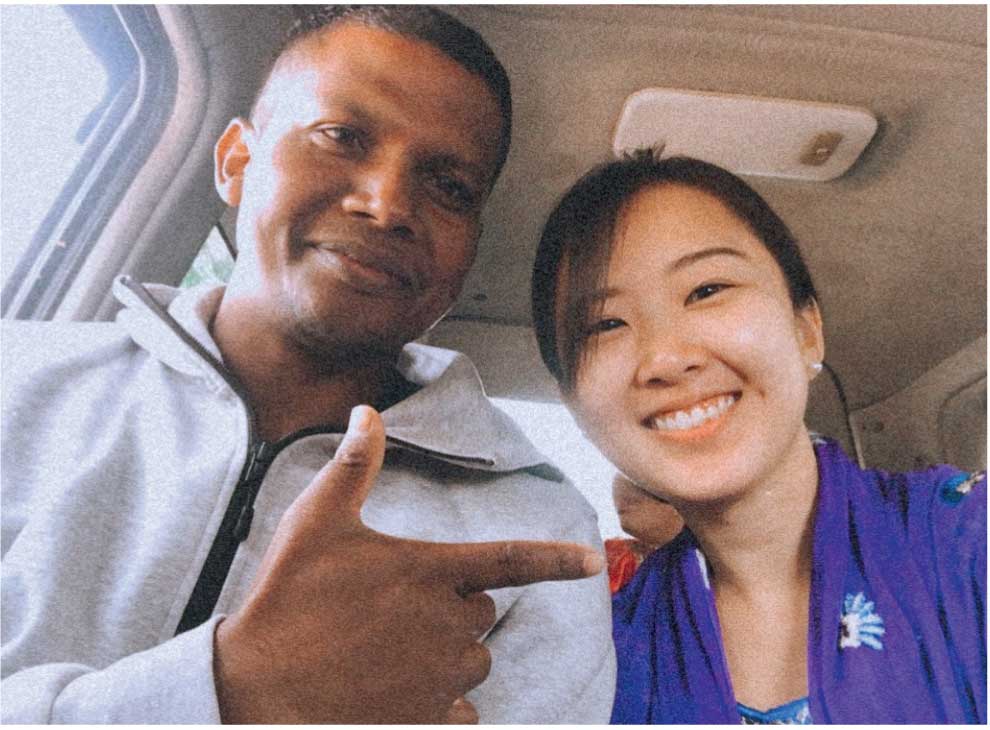
Bangladeshi worker Martin with Isabel Phua (image used here with his permission) during their visit to his native place.
BRIDGING THE KNOWLEDGE GAP
Driven by the desire to educate the public about the migrant worker community, the graduate of international business left her job in branding and marketing to start Migrant x Me in March 2019.
“Our mission is to build an inclusive society where we treat everyone, including our migrant community, fairly and with dignity. Unlike other migrant organisations, our focus is not on the direct impact on migrant workers such as legal or medical assistance, but instead on educating and empowering Singaporeans, specifically those between the ages of 13 and 35,” she explains.
For Phua, educating the young is important as they will grow up to be the next generation of voters, policy advocates and decision makers. Her hope is to encourage them to be caring and responsible ones. “We work mainly with secondary schools and corporates. In particular, our programmes and efforts are aligned with Singapore’s Social Studies and Character and Citizenship Education curricula, which give us an opportunity to impact thousands of secondary school students,” she elaborates.
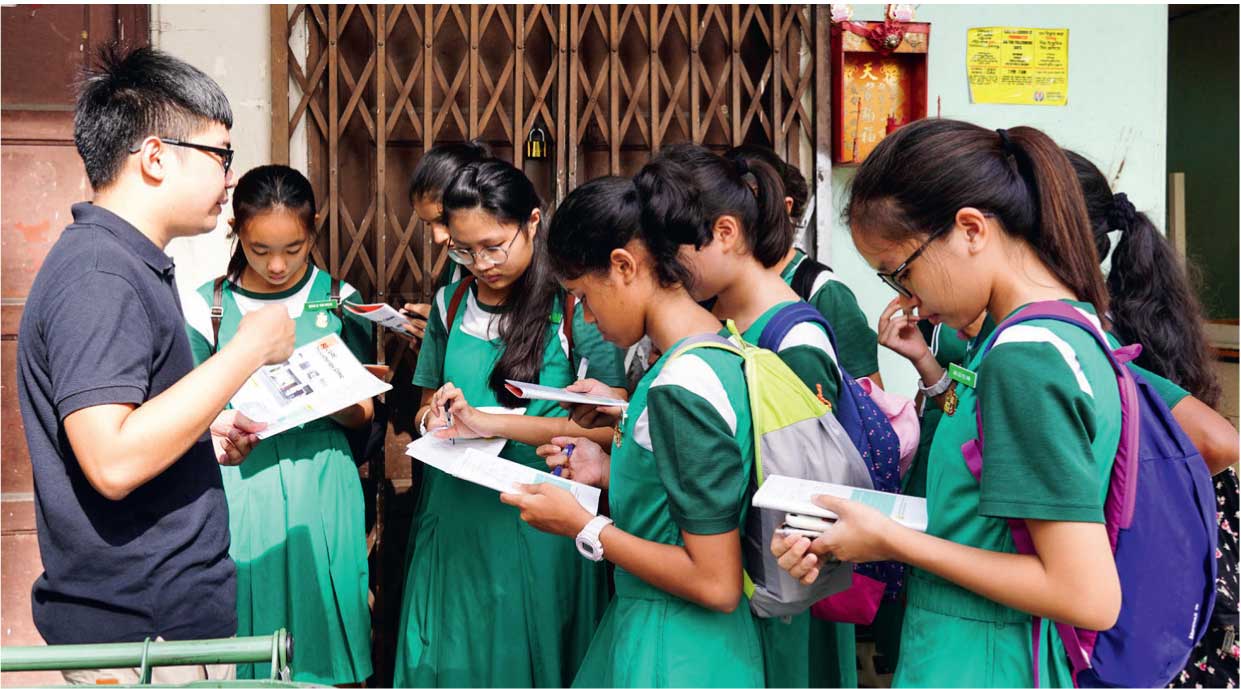
Migrant x Me works with secondary school and tertiary students to provide them with knowledge as well as a platform to give back to the migrant worker community
DECODING COMPLEXITIES
Migrant x Me’s work involves two key components: bringing knowledge to the public and providing them with a platform to give back to the migrant worker community. All its profits are ploughed back into the organisation rather than given to directors and partners.
Before the Covid-19 pandemic brought physical activities to a halt, Phua, her staff and volunteers conducted regular learning journeys that exposed participants to complex migrant worker issues.
These often took place in Singapore’s Farrer Park, an area close to the Little India enclave, which is popular among Indian and Bangladeshi migrant workers. The programme also included a stop at a physiotherapy clinic frequented by migrant workers, run by a partner NGO, SG Accident Help Centre (SGHAC).
“Our learning journeys feature different stations where we bring up the issues and complexities of the migrant workers’ lives, such as the psychological effects of workplace injuries on a worker, and the power imbalance between employers and the workers,” she explains. “They also serve as a platform to confront potential prejudices and stereotypes harboured towards the migrant community.”
Apart from the educational programmes, Migrant x Me seeks to provide participants with opportunities to give back to the community – whether through volunteering with NGOs or coming up with initiatives such as fundraisers, and linking skilled volunteers from its programmes such as physiotherapists and lawyers with SGHAC.
One project in particular saw 30 volunteers from Enterprise Singapore come together to distribute care packages with Project Chulia Street, a ground-up initiative that aims to increase the social and economic mobility of migrant workers.
Students from Riverside Secondary School and Raffles Girls’ School also came up with their own fundraising campaigns reaching their peers and families. In the early stages of the Covid-19 outbreak, students from Tanjong Katong Girls’ School packed care packages containing dry food and toiletries to distribute to injured workers cared for by SGAHC.
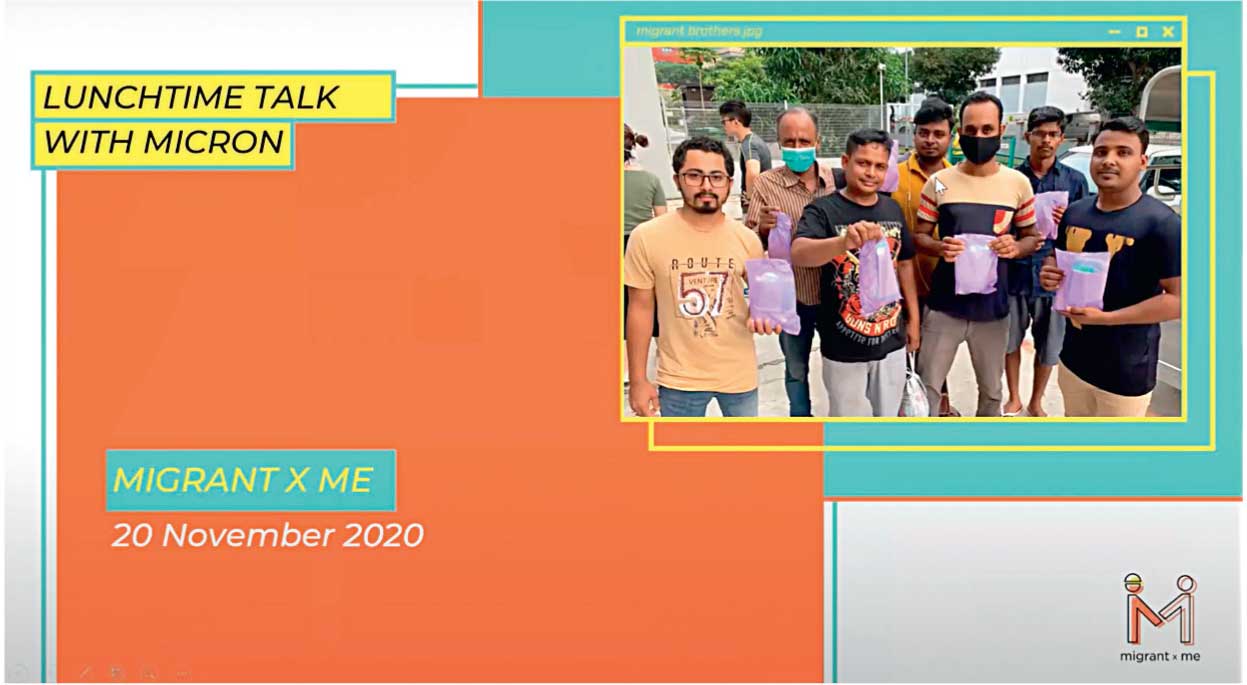
Isabel Phua and her team collaborate with corporate partners to create a better understanding about migrant workers and distribute care packages to them.
“WHILE DISCUSSING WHAT TO DO WITH OUR SRVS, IT STRUCK ME THAT WE COULD PUT THEM TO BETTER USE. MY FRIENDS AND I DECIDED TO TREAT THE [MIGRANT WORKERS] WITH A VISIT TO GARDENS BY THE BAY AND A MEAL. IT WAS A HUMBLING EXPERIENCE AND A PRIVILEGE,” SAYS SINGAPOREAN VOLUNTEER JASLYN MIN.
CONVERSATION ON INCLUSIVITY
When safe distancing measures kicked in to stem the spread of Covid-19 last year, Migrant x Me came up with a digital series that features pre-recorded video lessons. These programmes have reached out to a larger audience through local media coverage. “Reading a news article about the work of Migrant x Me offered me another peek into the world of the migrant workers in Singapore,” says Dr Yee Fook Cheong, associate professor of engineering, Singapore Institute of Technology.
“I was impressed with how [Phua] identified the workers’ needs, came up with a value proposition, and built a sustainable social enterprise. It complements the government’s effort in building a more caring and inclusive society.”
The conversation around inclusivity has gained momentum among both Singaporeans as well as foreign residents. As part of a recent Migrant x Me initiative, many willingly donated their SingapoRediscover Vouchers (SRV) – $100 tourism credits given to all citizens aged 18 and above to spend on local tourist attractions – to migrant workers to express their appreciation. One such individual was Jaslyn Min, who in turn mobilised her friends to contribute to the drive.
“While discussing what to do with our SRVs over dinner, it struck me that we could put them to better use instead of enjoying them ourselves,” she says.
“The migrant workers have suffered a lot during the pandemic, and worse still, they have been unable to visit their families back home. My friends and I decided to treat them with a visit to Gardens By The Bay and a meal. It was a humbling experience and a privilege to be able to personally thank them for their sacrifices.”
“MANY ASSUME THAT MIGRANT WORKERS ARE ONLY TOO HAPPY TO WORK IN SINGAPORE. BUT THERE ARE MANY ECONOMIC PUSH-AND-PULL FACTORS THAT EXIST BOTH LOCALLY AND IN THEIR HOME COUNTRIES,” SAYS ISABEL PHUA.
Phua is heartened to note that through such initiatives, a large number of participants have recognised their previously held prejudices towards the migrant community. “Many assume that migrant workers are only too happy to work in Singapore. But there are many economic push-and-pull factors that exist both locally and in their home countries,” she says.
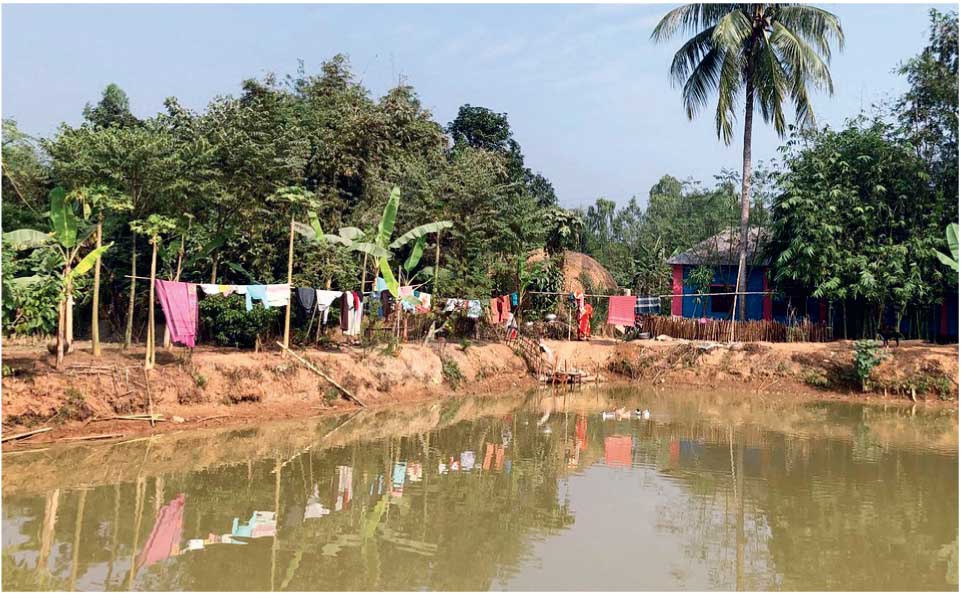
Volunteers with Migrant x Me visited the home of Bangladeshi migrant worker Martin, where he showed the team his modern Singapore-inspired washroom and a fish farming pond. Image used here with Martin’s permission.
Others also perceive migrant workers to be uneducated, unable to communicate in English, or lacking the ability to possess and express a spectrum of emotions. “This is untrue. Most of the workers have some form of education, whether academic or technical, with some even possessing university degrees. While it is true that their command of English varies, it would be a blanket statement to assume they are unable to express themselves. In fact, we have seen many migrant workers who have been doing so through different cultural activities in recent years,” she adds.
A SPECIAL CONNECTION
Indeed, Phua has developed an innate knowledge about the lives of migrant workers – not just through years of friendship with them, but from three different trips to Bangladesh and India in 2016, 2018 and 2019.
Her last visit to Bangladesh was particularly significant: She finally got to meet the families of the workers whom she had been communicating with through longdistance calls over the last five years.
“One of the families called me their Singaporean daughter because we have known them for years. We were so happy to meet each other face to face,” she says.
Another migrant worker, Martin, managed to join them during this trip, and they flew up to Dinjapur in northern Bangladesh to visit his family.
“He was so excited to show us his modern toilet, inspired by his time spent in Singapore, as well as a fish farming pond and an animal rearing farm that he had built,” she recalls. “I was so amazed at his craftsmanship. We all have different strengths and capabilities and there should be opportunities to learn from one another.”
For 33-year-old medical researcher Ang Hui Ying, who has been volunteering with Migrant x Me as its programmes operations manager, it was the hospitality of her hosts that really stood out.
“I had never met most of them face to face, but they treated us like their own because we are friends with their sons back in Singapore. They cooked up a storm and treated us to so many of their local delights – I was overwhelmed by their generosity,” she says.
The trip has also given her a chance to better understand her migrant friends. “We heard about the little things that have made the migrant workers who they are today from their wives, parents, children, relatives and even school teachers!” she says.
The insights gained through these trips have helped Phua and her team curate digital programmes for secondary schools, with contributions and guidance from Bangladeshi volunteers. “Prejudice starts when one is unfamiliar with something. By sharing more about the workers’ culture and even showing pictures of their food, villages and towns, we hope that we can help build a better understanding about their lives in Singapore,’’ she emphasises.
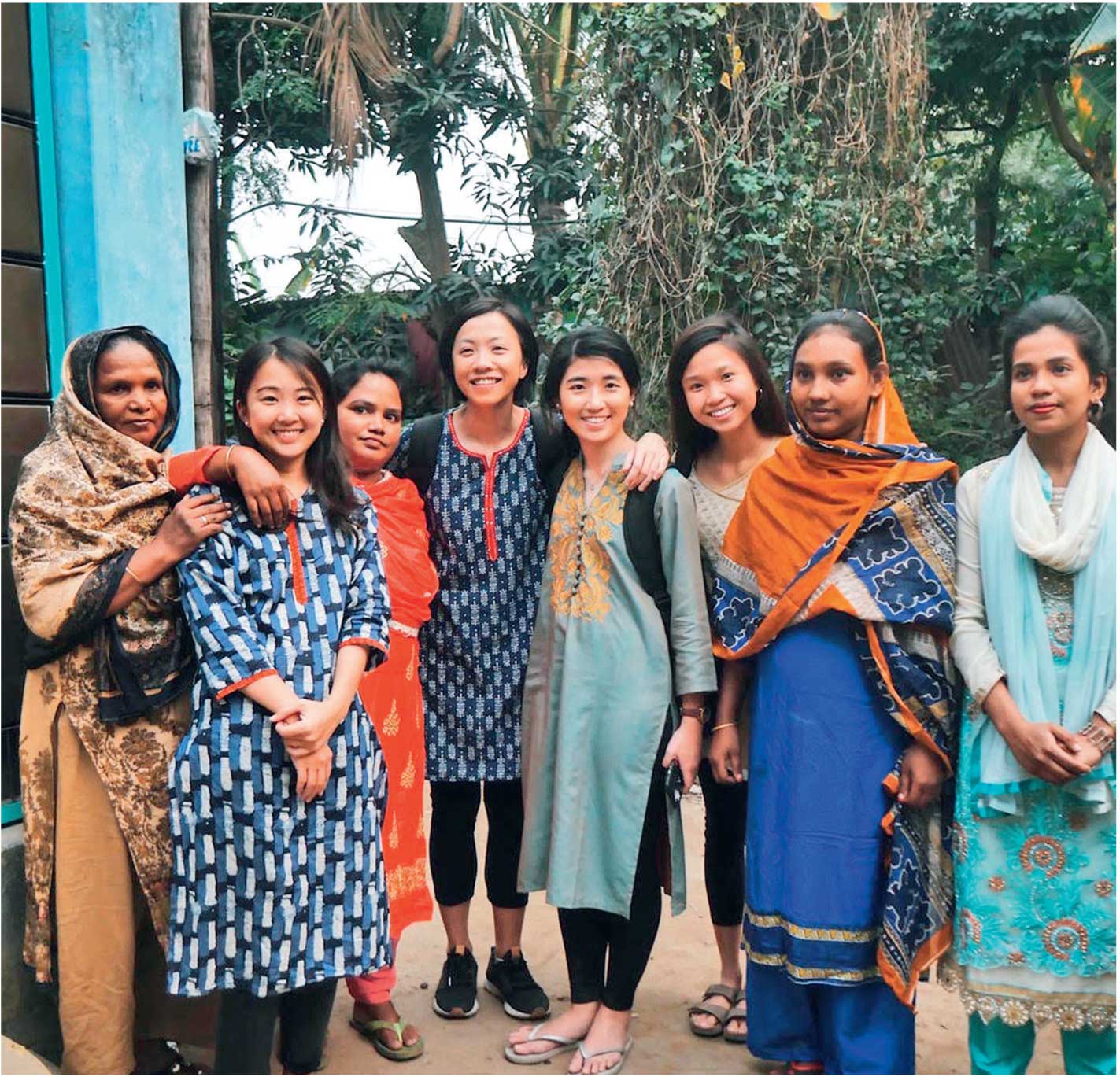
Phua (second from left) and her team visited the families of Singapore’s migrant workers in Bangladesh to gain a better understanding of their lives back home, and use the insights in putting together impactful programmes for Singaporean youth.
“We heard about the little things that have made the migrant workers who they are today from their parents, wives, children, relatives and even school teachers.” Ang Hui Ying, volunteer, Migrant x Me
OVERCOMING PREJUDICE
Despite a recent shift in Singaporeans’ perception about migrant workers, challenges remain aplenty. Phua points to a 2019 survey conducted by the International Labour Organisation and Institute of Policy Studies among Singaporeans, in which 53 per cent of the respondents believed it was extremely challenging for locals to unconditionally accept the migrant workers and the latter’s ability to seamlessly assimilate, owing to socio-cultural differences. “Many Singaporeans are not completely familiar with the migrant workers’ place in our community. We also need to allay misplaced notions that they can alter our cultural fabric,” she explains.
On a brighter note, Phua observes a significant increase in the number of outreach initiatives started by Singaporeans to help decrease the socio-cultural barriers between the two groups.
Another key challenge that her team aims to highlight is the financial burden the mainly South Asian workers face when they incur loans to land jobs here, and the distress they face from salary disputes with employers. While Migrant x Me does not provide direct assistance to workers on these issues, Phua says it is important to shed light on them to bring about a more synergistic understanding about the migrant worker community.
Acknowledging the critical work done by local NGOs in advocating for policy changes and providing medical aid, she says her firm’s niche is in bridging complex migrant issues with the youths in Singapore, and empowering them to know what role they can play as part of civil society.
“As we strive to transform societal attitudes and perceptions through our programmes and other efforts, Singapore can become a more diverse and inclusive society,” she says.
